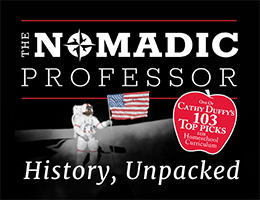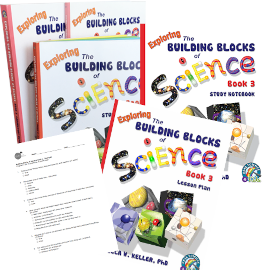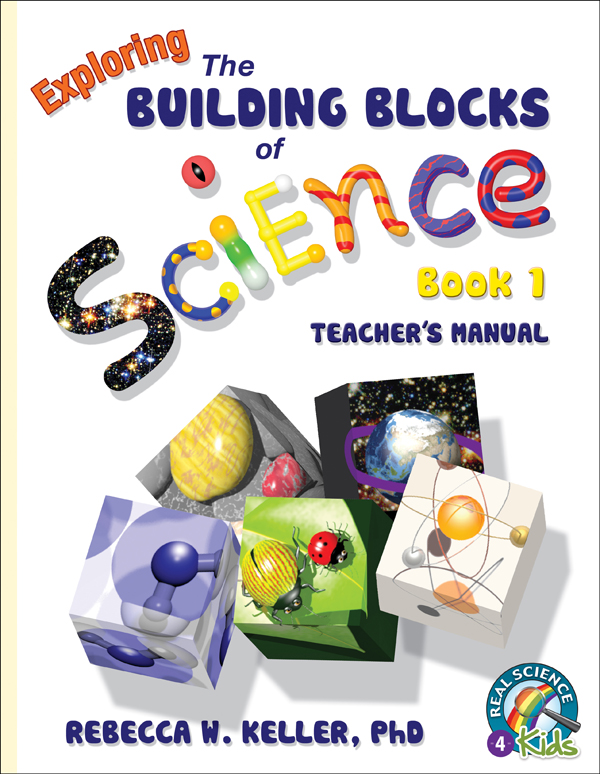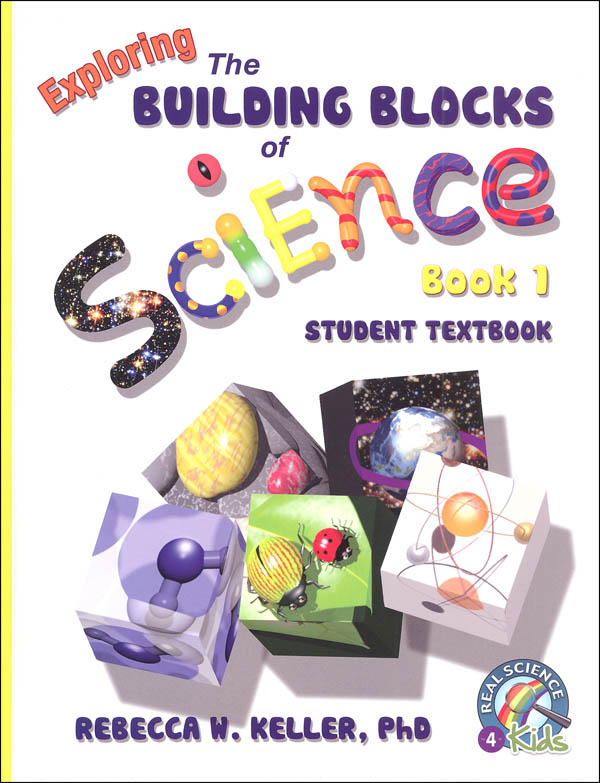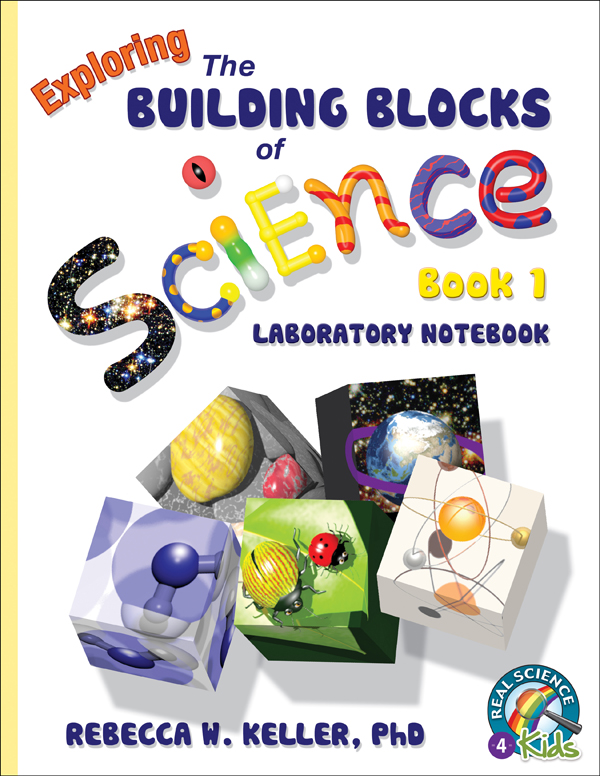Exploring the Building Blocks of Science, a religiously neutral science series of seven courses created by Dr. Rebecca Keller, is a repackaged version of the content in her Focus On series with some changes and additions. Both series are part of the Real Science 4 Kids product line. Overall, Building Blocks has a bit more content than the Focus On series.
The Focus On series has individual textbooks on chemistry, biology, geology, astronomy, and physics that can each be used for kindergarten through fourth grade. Then it addresses those same disciplines again in textbooks for grades five through eight. Building Blocks covers all five science disciplines each year for a span of seven years, with Book 1 through Book 7 for grades one through seven. (In most cases, the course number will correspond with the student’s grade level.)
Here's an example of how the five disciplines are covered. In Exploring the Building Blocks of Science: Book 1, the first chapter (consisting of four lessons) is an introduction to science, the history of science, and the scientific method. The next four chapters are on chemistry, with a total of 18 lessons within those chapters. Then biology, physics, geology, and astronomy follow in that order. Each of those disciplines has four chapters with 12 to 17 lessons each. Different topics from all five science disciplines are covered in this fashion in each course. Beginning in Book 5, Building Blocks courses begin to repeat topics previously covered at a higher level.
The content throughout the series is substantive and challenging. For instance, the third chapter of Book 1 introduces the concept of electrons and their availability for bonding, and Book 7 introduces the complex structures of carbon-containing molecules such as polysaccharides. Dr. Keller stresses the use of the scientific method, critical thinking, and creative thinking while also incorporating observations and hands-on activities. The courses do not require a lot of written work and tests.
The three essential books for each of these courses are the student textbook, a teacher’s manual, and a laboratory notebook. When you order a set of the three books for a course, you also receive a free Lesson Plan Book PDF. The lesson plans let you schedule the days on which students will complete the components of each lesson as well as the supplemental activities. There are two other optional components that are sold as PDFs only by the publisher: a study notebook and a packet of tests.
Student Textbook
Each textbook for Building Blocks is intended for a full school year. The student textbooks are printed in full color with plentiful illustrations that make it easier to grasp the sometimes challenging content. Each textbook has 22 chapters, and students are expected to complete one chapter per week. The textbooks are self-explanatory, so lessons don’t need to be presented by a parent or teacher, even though reading aloud and discussing should be beneficial. Each chapter concludes with a summary of key points. Questions are in the laboratory notebook and the teacher's manual rather than in the student textbook.
Laboratory Notebooks and Teacher’s Manuals
The laboratory notebooks have one experiment or observation to be completed for each chapter of the textbook, and each experiment or observation has a number of sections. First, students are given questions to answer to help them think about the topic. Then they will perform one or more steps for the experiment or observation, followed by drawing pictures or writing about what they observed or discovered. Each laboratory notebook task concludes with an explanation and an optional follow-up experiment under the heading “Just for fun.”
The teacher's manual for each course serves as a guide for the laboratory notebook rather than for the textbook. It lays out a lesson presentation for each activity. While the laboratory notebooks require students to work through the scientific method, they also pose "Think About It" questions where students must apply what they have learned in the textbook. Additional discussion questions are in the teacher’s manuals.
The teacher’s manuals have lists of materials you will need for each experiment. These are mostly household items and other things that are easy to find or purchase. However, there are occasional exceptions, such as a microscope for biology. The lists are quite long, so you need to plan ahead to gather what you will need, or you can purchase a ready-made kit for the course from Rainbow Resource Center.
The laboratory notebook activities are supposed to be completed in one day according to the lesson plans, but some of them, such as sprouting beans, will definitely take longer.
Suggested answers or expected results are often shown in the teacher's manuals, but many questions are open ended. It is best if parents read the textbook and discuss it with their children and also guide them through the lab activities. As they do so, parents should be able to easily evaluate student responses in the laboratory notebooks. Parents who want to use tests can use the optional test packet that has two midterms, a final exam, and an answer key.
Study Notebooks
The study notebook for each course is optional, and the format differs significantly between those for the first four levels and those for the Book 5 course and above. Study notebooks for grades one through four reinforce and review the material in each chapter. They have full-color pages with activities such as filling in blanks, drawing, writing, cutting and pasting, and assembling mini-books. The instructions have students use a file folder to create a cover for this notebook, but you could just as well put the pages into a thin binder. These study notebooks might make recording and studying information more appealing for some students.
The study notebooks for Book 5 and above are much more open ended. They have black and white pages that give prompts for additional research and writing, offer opportunities for creative thinking, provide space for students to draw, and encourage students to explore ideas about science in a way that is not graded or evaluated in a traditional manner.
Supplemental Books
Real Science 4 Kids has also published many small, colorful information books, such as Atoms, DNA, Molecules, Photosynthesis, Sea Jellies, and Wheels on a Bike. There are 14 of these supplemental books on biology, 10 for chemistry, and 8 for physics. (None are available for geology and astronomy.) They are sold either individually or as sets. They fit in very well alongside the courses for grades one through four.
Summary
You might need additional time for some activities, reviewing, and tests, but that should still leave you with a few extra weeks in the school year without science lessons. I wouldn’t be concerned since the content of these courses is challenging, and students should learn more than enough if they complete one course per year.





